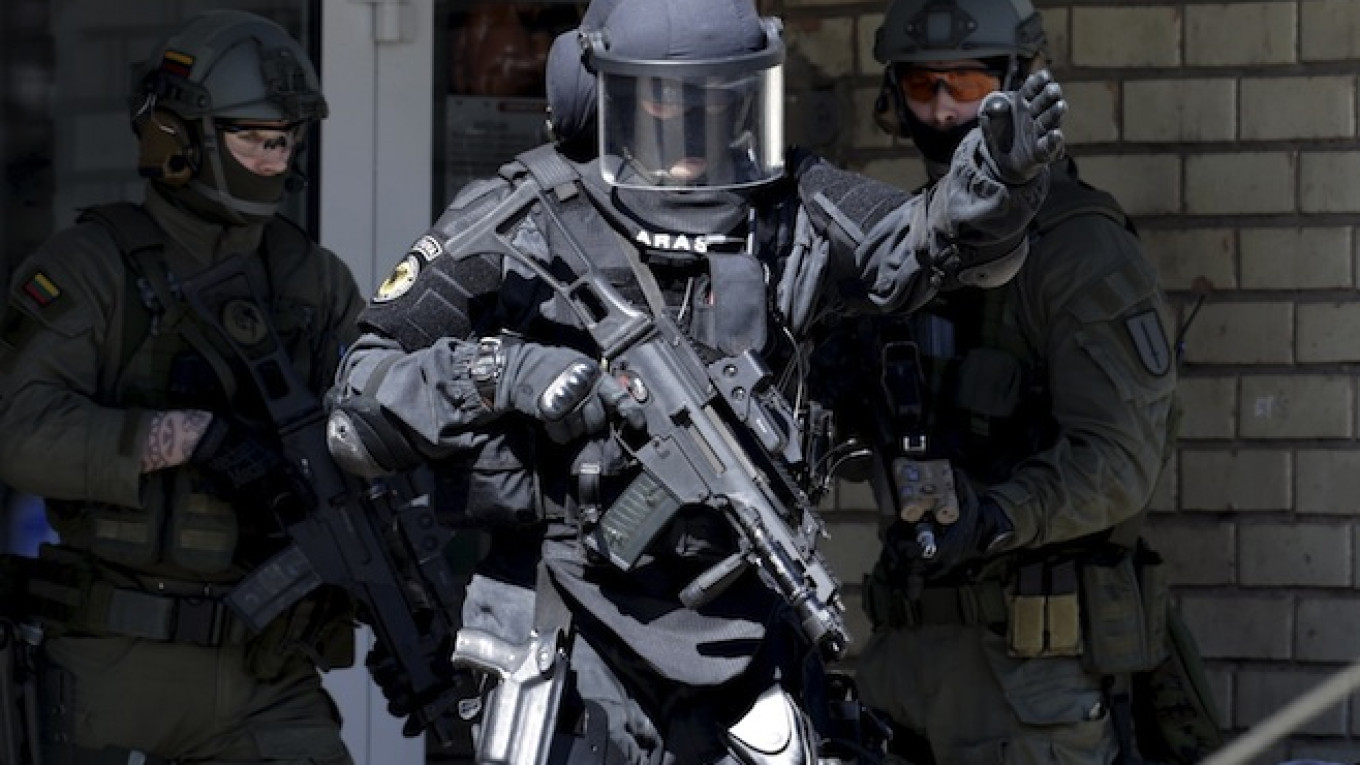TALLINN / RIGA — From sabotage of energy installations to cyber attacks and declarations of "independence" by Russian-speaking border villages, the Baltic states are preparing for possible flash points of war.
Ukraine's conflict with Moscow-backed separatists has unnerved Latvia, Lithuania and Estonia, the only parts of the former Soviet Union that have joined NATO and the European Union.
They are small, geographically isolated from the rest of the EU, and have Russian-speaking minorities, which President Vladimir Putin declared last year gives Moscow the right to intervene with military force.
Their fear is not only about a conventional war of tanks rolling across 627 miles (1,009 km) of border, but of smaller, ambiguous incidents similar to the tactics Moscow employed to wrest control of Ukraine's Crimea Peninsula last year.
For more than a year the three countries have prepared for a kind of murky conflict or "hybrid war," with exercises against "saboteurs," campaigns against Russian "propaganda" and increased spending on defense and border security.
Lithuania held a simulation in May of separatist groups attacking installations near Russia's enclave of Kaliningrad, a base of Moscow's Baltic fleet that is connected to the rest of Russia by a train line through Lithuania.
The exercise was modeled on last year's capture of Crimea by Russian soldiers in unmarked uniforms, who came to be known as the "little green men" when Moscow denied they were Russian troops until the takeover was complete.
"We need to learn lessons which we learned in Crimea, which we partly see in the east of Ukraine. Any possible attack, in any form, needs to be taken seriously," Lithuanian President Dalia Grybauskaite told Reuters in May. "What makes sense for us is to be prepared for anything."
Many Baltic residents say concerns over Russia have filtered down to daily life, to the extent the possibility of Russian occupation comes up when many people discuss buying homes.
Fear of occupation runs deep in the Baltic states, which were annexed by the Soviet Union under Stalin's secret 1939 pact with Hitler, overrun by the Nazis during World War II and then recaptured by the Red Army and held until the Soviet Union fell.
"The Baltics have good reason to be fearful of Russia's actions. There are many people alive today who have personally seen tactics similar to those deployed in Ukraine," said Andres Kasekamp, Baltic politics professor at Tartu University in Estonia.
Air sorties by Russian fighters have raised fears of possible accidents that could erupt into wider conflict. There may have been at least one near miss with a Swedish airliner over the Baltic sea.
Latvia and Estonia have large Russian-speaking minorities on their borders with Russia, including residents who hold Russian passports.
Latvia's security services launched an inquiry this year after Facebook posts appeared promoting separatism in several villages in majority Russian-speaking regions.
In May's exercise, some 3,000 Lithuanian troops simulated a response to armed groups seizing local government buildings to declare a separatist government, actions that pro-Russian separatists have carried out in cities across Ukraine since last year. Municipalities on Latvia's border have also held seminars on how to react to "green men."
"There might be some kind of provocation," said Igor Vatolin, a Latvian ethnic Russian journalist who campaigns against Putin's policies. "Such people could seize a municipality near the border for a couple of hours or couple of days and declare some kind of local republic."
Estonia is mindful of 2007, when a decision to relocate a bronze statue of a World War II Soviet soldier sparked violent protests from Russian speakers and widespread cyber attacks.
It held its biggest-ever exercise this year simulating cyber attacks, with 16 nations participating.
Some experts say that while invasion is unlikely, Russia could test Article 5 of NATO's treaty, which states that an attack on one of its members is an act of aggression against all, obliging them to react.
Much of the Russian border is poorly delineated. Last year Estonia formally protested what it said was the abduction of an intelligence officer — spirited across the frontier into Russia under cover of smoke bombs and jamming of communications. Russia says he was arrested after crossing their border to spy.
In March, Lithuania stopped a train bound for Kaliningrad after reports that Russian soldiers were on board without permission. The men turned out to be students.
Some say Baltic "hybrid war" fears may be exaggerated, given their strong democracies and the protection of NATO membership.
"Baltics have felt vulnerable for many years and they perhaps are now feeling over-vulnerable, although perhaps that is understandable given their history," said Neil Melvin, an expert on the region at the Stockholm-based SIPRI think tank.
A Message from The Moscow Times:
Dear readers,
We are facing unprecedented challenges. Russia's Prosecutor General's Office has designated The Moscow Times as an "undesirable" organization, criminalizing our work and putting our staff at risk of prosecution. This follows our earlier unjust labeling as a "foreign agent."
These actions are direct attempts to silence independent journalism in Russia. The authorities claim our work "discredits the decisions of the Russian leadership." We see things differently: we strive to provide accurate, unbiased reporting on Russia.
We, the journalists of The Moscow Times, refuse to be silenced. But to continue our work, we need your help.
Your support, no matter how small, makes a world of difference. If you can, please support us monthly starting from just $2. It's quick to set up, and every contribution makes a significant impact.
By supporting The Moscow Times, you're defending open, independent journalism in the face of repression. Thank you for standing with us.
Remind me later.


